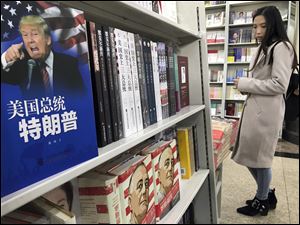
North Korea, trade deficit on agenda of Trump's China visit
11/7/2017
A book with the title "American President Trump" is placed on a shelf for a photo at a section of a book store on foreign leaders in Beijing, China, Tuesday, Nov. 7, 2017.
BEIJING — President Donald Trump’s agenda in Beijing is expected to be led by the standoff over North Korea’s nuclear weapons and demands that China do more to balance trade with America.
Trump’s meetings with Chinese President Xi Jinping will be grander than their informal April talks at Trump’s Mar-a-Lago resort in Florida. That visit was most memorable for Trump informing Xi about ordering a missile strike on Syria while they ate a dessert of chocolate cake.
Officials from both sides say Trump has forged a personal connection with Xi, and Chinese officials have said they expect the leaders to continue to have “in-depth, constructive, friendly and productive” talks.
Xi was named last month to a second five-year term as the leader of China’s Communist Party at a congress that elevated his status as China’s most powerful leader in decades. In a recent interview, Trump likened Xi to “a king.”
A look at the thorny issues the two leaders will likely discuss:
NORTH KOREA
China is North Korea’s chief trading partner and source of aid and diplomatic support, and Trump has pressed for Beijing to take more forceful measures against Pyongyang.
China has already agreed to tough new U.N. penalties that would substantially cut foreign revenue for the isolated North. It has ordered North Korean-owned businesses and ventures with Chinese partners to close by early January. China also has promised to cut off gas and limit shipments of refined petroleum products, effective Jan. 1.
Beijing, however, adamantly opposes steps that could bring down North Korean dictator Kim Jong Un’s government. Thus China has made no mention of crude oil, which makes up the bulk of Chinese energy supplies to North Korea and is not covered by U.N. sanctions.
China argues that sanctions alone cannot solve the impasse, and has urged Washington to cool its rhetoric and open a dialogue with North Korea. U.S. Secretary of State Rex Tillerson told reporters last month that Washington has lines of communication to Pyongyang.
TRADE
Trump wants to narrow China’s trade surplus with the United States, which stood at $347 billion in 2016, but has yet to say what he might propose this week.
Washington has raised duties on Chinese goods including stainless steel and plywood to offset what it says are improper subsidies and is investigating whether Beijing improperly pressures foreign companies to hand over technology.
Some American companies worry that Trump’s focus on trade in goods might mean he pays too little attention to other issues such as Chinese rules that limit their presence in finance, health care and other service industries.
Chinese officials have rejected U.S. accusations that China engages in predatory policies at the expense of its neighbors.
SOUTH CHINA SEA
China and the U.S. are at odds over Beijing’s military buildup, island-building and assertive claims to disputed islands in the South China Sea.
Washington has criticized such moves and says it has a national interest in freedom of navigation in sea lanes critical for world trade. Tillerson said last month that China’s “provocative actions” in the waters are a challenge to international law and norms.
But China says the U.S. has no territorial claim in those waters and should let countries in the region manage their own disputes.
“I think it would certainly be better if others, including the United States, would not try to interfere in this constructive process,” China’s ambassador to the U.S., Cui Tiankai, told reporters in Washington last week.
MARKET ACCESS, DATA CONTROLS
The American Chamber of Commerce in China wants Beijing to ease market barriers such as limits on foreign ownership of enterprises in finance and other industries.
The chamber has called for faster approval of new seeds and agriculture-related biotechnology. Foreign business groups express concern that Chinese plans for government-led development of electric cars and other technology will limit their presence in emerging industries.
U.S. companies also say increasing Chinese restrictions on internet use, the movement of data and the use of foreign security technology hamper their business and give local competitors an unfair advantage.
Foreign business groups have appealed to Beijing to scale back or scrap rules that Chinese officials say will safeguard national security and personal privacy but that companies warn might weaken data protections. Trump has yet to say what action his government might take.
Twitter is among the platforms blocked by Chinese censors.
Asked whether Trump would be able to tweet from Beijing, Chinese Vice Foreign Minister Zheng Zeguang told reporters on Friday, “We take everything into account on receiving foreign heads of state, so you should have no reservations about Mr. President’s ability to keep in touch with the outside.”
OPIOIDS
Trump has said he will make China’s connection to the U.S. opioid crisis a major theme of his talks.
Chinese officials have disputed Trump’s claim that the opioid fentanyl, which is flooding the U.S., is produced mostly in China. China doesn’t deny that some fentanyl produced illicitly inside the country makes its way to the United States, but officials say there is no data proving the majority of fentanyl used in the U.S. comes from China.
Trump said last month that the U.S. was stepping up measures to curb the flow of fentanyl, a synthetic opioid. He has said he would mention it to Xi.
“And he will do something about it,” Trump said.